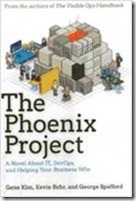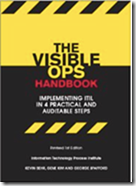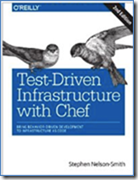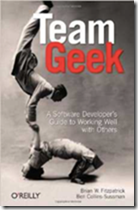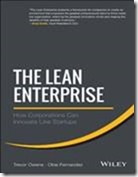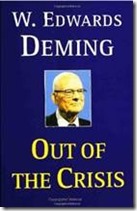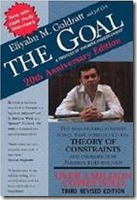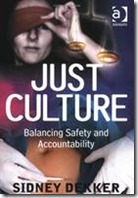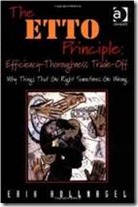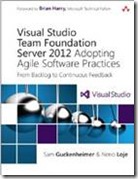Top 10 DevOps Books for IT Operations
Regardless whether you consider yourself a decision maker in IT or if you are an ITI (IT Implementer), check out our top 10 booklist. Consider it our suggestion for an early summer read.
Rather than a comprehensive guide to every book you may want to read about DevOps, this post reflects literature my team and I have been reading over time and consider it our must-reads to get started and dive in. My hope is our list will help you exploring the some of the background, some key challenges, and a bit about the general theory behind collaboration and team work.
Also check out the second installment
of this post: More Top 10 DevOps Books
And of course we hope you share back you favorite book related to the topic of DevOps. Without any further ado, the list*, in no particular order.
|
Bill is an IT manager at Parts Unlimited. It's Tuesday morning and on his drive into the office, Bill gets a call from the CEO. The company's new IT initiative, code named Phoenix Project, is critical to the future of Parts Unlimited, but the project is massively over budget and very late. The CEO wants Bill to report directly to him and fix the mess in ninety days or else … |
|
|
The Core of Visible Ops Visible Ops is a methodology designed to jumpstart implementation of controls and process improvement in IT organizations needing to increase service levels, security, and auditability while managing costs. Visible Ops is comprised of four prescriptive and self-fueling steps that take an organization from any starting point to a continually improving process. … |
|
Test Driven Infrastructure with Chef Test-Driven Infrastructure with Chef demonstrates a radical approach to developing web infrastructure that combines the powerful Chef configuration management framework with Cucumber, the leading Behavior-driven development (BDD) tool. Learn how to deliver real business value by developing infrastructure code test-first. … |
|
|
In a perfect world, software engineers who produce the best code are the most successful. But in our perfectly messy world, success also depends on how you work with people to get your job done. In this highly entertaining book, Brian Fitzpatrick and Ben Collins-Sussman cover basic patterns and anti-patterns for working with other people, teams, and users while trying to develop software. … |
|
|
The first and most comprehensive book on bringing the startup mindset into large organizations. Forget vague notions of creating an "innovative culture." This book reveals the methodologies, tools, and incentive structures guiding the world's largest organizations to reclaim their innovation prowess. … |
|
|
Getting software released to users is often a painful, risky, and time-consuming process. This groundbreaking new book sets out the principles and technical practices that enable rapid, incremental delivery of high quality, valuable new functionality to users. Through automation of the build, deployment, and testing process, and improved collaboration between developers, testers, and operations, … |
|
|
"Long-term commitment to new learning and new philosophy is required of any management that seeks transformation. The timid and the fainthearted, and the people that expect quick results, are doomed to disappointment." According to W. Edwards Deming, American companies require nothing less than a transformation of management style and of governmental relations with industry. … |
|
The Goal: A Process of Ongoing Improvement In this intriguing, readable business novel, which illustrates state-of-the-art economic theory, Alex Rogo is a UniCo plant manager whose factory and marriage are failing. To revitalize the plant, he follows piecemeal advice from an elusive former college professor who teaches, for example, that reduction in the efficiency of some plant operations may make the entire operation more productive. … |
|
|
A just culture protects people's honest mistakes from being seen as culpable. But what is an honest mistake, or rather, when is a mistake no longer honest? It is too simple to assert that there should be consequences for those who 'cross the line'. Lines don't just exist out there, ready to be crossed or obeyed. We-people-construct those lines; and we draw them differently all the time, depending on the language we use to describe the mistake, on hindsight, history, tradition, and a host of other factors. … |
|
|
Accident investigation and risk assessment have for decades focused on the human factor, particularly ‘human error’. This bias towards performance failures leads to a neglect of normal performance. It assumes that failures and successes have different origins so there is little to be gained from studying them together. Erik Hollnagel believes this assumption is false and … |
|
Bonus |
|
|
This is the definitive guide to applying agile development and modern software engineering practices with Visual Studio Team Foundation Server 2012—Microsoft’s complementary Application Lifecycle Management (ALM) platform. Written by the Microsoft Visual Studio product owner and a long-time Team Foundation Server implementation specialist, … |
I am convinced you have additional suggestions!
Did you find any great book that should have been suggested here? Which one did we miss? What's your favorite anyway?
Have fun
* All references are to the Amazon bookstore
